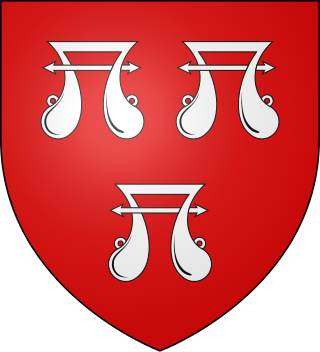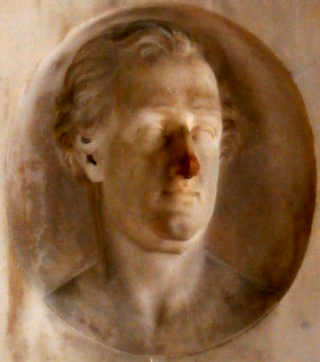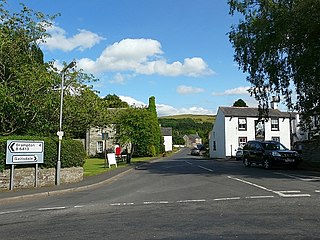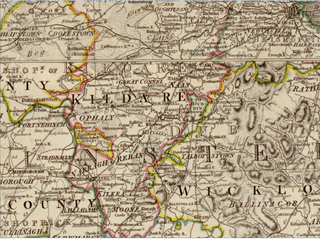Related Research Articles

William the Lion, sometimes styled William I and also known by the nickname Garbh, 'the Rough',, reigned as King of Scots from 1165 to 1214. His 48-year-long reign was the second longest in Scottish history, and the longest for a Scottish monarch before the Union of the Crowns in 1603.

Hubert de Burgh, Earl of Kent was an English nobleman who served as Chief Justiciar of England and Ireland during the reigns of King John and of his son and successor King Henry III and, as a consequence, was one of the most influential and powerful men in English politics in the thirteenth century.

William Ros or Roos, 1st Baron Ros of Helmsley, was one of the claimants of the crown of Scotland in 1292 during the reign of Edward I.

Sir Robert Burdett, 3rd Baronet DL was an English baronet and Tory politician.
William Hare, 1st Earl of Listowel, known as Lord Ennismore from 1800 to 1816 and as the Viscount Ennismore and Listowel from 1816 to 1822, was an Irish peer and Member of Parliament.

Sir Andrew Agnew, 7th Baronet was a Scottish politician and a prominent promoter of Sunday Sabbatarianism, which brought him to the notice of Charles Dickens who criticised both his cause and his character.

Henry Frederick Carteret, 1st Baron Carteret PC (1735–1826), of Haynes, Bedfordshire, was Member of Parliament for Staffordshire (1757–1761), for Weobley in Herefordshire (1761–1770) and was Master of the Household to King George III 1768–1771. He was hereditary Bailiff of Jersey 1776–1826.

Castle Carrock is a village and civil parish on the B6413 road, in the City of Carlisle District, in the English county of Cumbria about 3 miles (4.8 km) south of Brampton. The population of the Civil Parish was 303 in 2001 and rose to 328 by 2011. It has a pub, The Duke of Cumberland, a primary school and many walks. More recently Castle Carrock is known for 'Cumbria's Most Friendly Music Festival' Music on the Marr which takes place each year at the end of July. It attracts a diverse crop of music, entertainers, artists and poets from around the world.

The High Sheriff of Kildare was the British Crown's judicial representative in County Kildare, Ireland from the 16th century until 1922, when the office was abolished in the new Free State and replaced by the office of Kildare County Sheriff. The High Sheriff had judicial, electoral, ceremonial and administrative functions and executed High Court Writs. In 1908, an Order in Council made the Lord Lieutenant the Sovereign's prime representative in a county and reduced the High Sheriff's precedence. However, the sheriff retained his responsibilities for the preservation of law and order in the county. The usual procedure for appointing the sheriff from 1660 onwards was that three persons were nominated at the beginning of each year from the county and the Lord Lieutenant then appointed his choice as High Sheriff for the remainder of the year. Often the other nominees were appointed as under-sheriffs. Sometimes a sheriff did not serve his full term due to death or another event, and another sheriff was then appointed for the remainder of the year. The dates given in this article are the dates of appointment.
William de Vesci (c.1125–1184) was an Anglo-Norman feudal lord and Sheriff. Born William fitz Eustace at Knaresborough Castle, Yorkshire, the son of Eustace Fitz John and Beatrix de Vesci, he took his mother's surname.

Beatrix de Vesci of Alnwick Castle, was an eleventh-century medieval noble lady of house de Vesci.
William Mostyn Owen, born William Mostyn, was a British land-owner and politician who sat in the House of Commons from 1774 to 1795.

Robert Lovell Gwatkin (1757–1843) was an English landowner, High Sheriff of Cornwall in 1789.
Sir Francis Gray, 14th Lord Gray FRS FRSE PSAS was a Scottish peer, politician and soldier.

John de Vaux also known as John de Vallibus was a 13th-century English nobleman.
de Vaux is the surname of an old Norman noble family.
Hubert de Vaux, also known as Hubert de Vallibus, was a prominent 12th-century English noble.
Robert de Vaux, also known as Robert de Vallibus,, Baron of Gilsland, was a prominent 12th-century English noble, who served as Sheriff of Cumberland in 1175 and 1176.
Ranulf de Vaux, also known as Randolph or Ranulf de Vallibus, Lord of Triermain and later Lord of Gilsland, was a prominent 12th-century English noble.
Sir Walter de Moray, Lord of Petty, Bracholy, Boharm, Arteldol and Bothwell, Justiciar of Lothian was a 13th-century Scottish noble.
References
- Burke, John (1850). A Genealogical and Heraldic Dictionary of the Landed Gentry of Great Britain & Ireland. Vol. 3. H Colburn.
- Lysons, Daniel; Lysons, Samuel (1816). Magna Britannia, being a concise topographical account of the several counties of Great Britain containing Cumberland. Vol. 4th.
- Moule, Thomas (1837). The English Counties Delineated: Or, A Topographical Description of England. Vol. 2. George Virtue.
- Stricklin, William A. (2018). Family Secrets. Dorrance Publishing Company, Incorporated. ISBN 978-1-4809-8155-3.